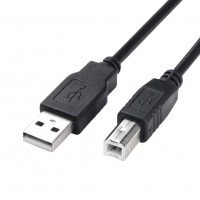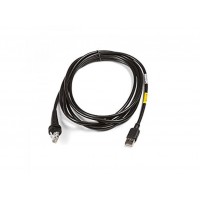No products
New products
-

BlackCopper BC-EGP-10G015-Z
Transform Your Business with BlackCopper BC-EGP-10G015-Z Dual Screen POS...
Rs 0
Catalog
The Ultimate Guide to USB Cables: Choosing the Right One for Your Needs
In today's tech-driven world, USB cables are an essential part of our everyday lives. From charging our smartphones to connecting our laptops to external devices, these seemingly simple cords play a crucial role in keeping us connected. However, with the abundance of option...
The Ultimate Guide to USB Cables: Choosing the Right One for Your Needs
In today's tech-driven world, USB cables are an essential part of our everyday lives. From charging our smartphones to connecting our laptops to external devices, these seemingly simple cords play a crucial role in keeping us connected. However, with the abundance of options available, selecting the right USB cable for your needs can feel overwhelming.
Understanding Different Types of USB Cables
USB cables are not all created equal. They come in various types, each designed for specific purposes and offering different capabilities. Here's a breakdown of some common types:
- USB Type-A: The most common type, widely used for connecting devices like printers, external hard drives, and USB flash drives.
- USB Type-B: Primarily used for connecting printers and other peripherals.
- USB Type-C: A newer, reversible connector gaining popularity due to its versatility and fast data transfer speeds. It's used for charging devices, connecting peripherals, and even video output.
- Micro-USB: A smaller connector commonly found on smartphones, tablets, and other mobile devices.
- Mini-USB: Another smaller connector, less common today but still used in some older devices.
Key Factors to Consider When Choosing a USB Cable
Several factors influence the performance and compatibility of a USB cable. Here are some crucial aspects to consider:
1. Cable Type and Compatibility
Ensure the cable type matches the device you are connecting. For example, a Type-C cable is needed to charge a phone with a Type-C port. Compatibility is crucial for reliable data transfer and power delivery.
2. Data Transfer Speed
USB cables have different data transfer speeds, measured in Mbps (megabits per second). If you're transferring large files, videos, or need fast data synchronization, consider cables with higher data transfer rates.
3. Power Output and Charging Capabilities
For charging devices, the power output of the USB cable is critical. Higher power output cables provide faster charging speeds. Look for cables with the required voltage and amperage to meet your device's charging needs.
4. Cable Length
Cable length is another essential factor. Choose a cable long enough for your setup without being excessively bulky or prone to tangling. Short cables are ideal for tight spaces, while longer cables provide greater flexibility and reach.
5. Durability and Build Quality
Opt for durable cables with quality materials like braided nylon or reinforced connectors. These cables withstand daily wear and tear, preventing fraying and damage.
Top USB Cable Brands
Several reputable brands offer high-quality USB cables, each with its unique strengths and features:
BlackCopper
BlackCopper is a leading brand known for its reliable and durable USB cables. They offer a wide range of cables, including those designed for high-speed data transfer, fast charging, and specific device compatibility.
TSC
TSC provides a range of USB cables catering to diverse needs. Their cables are known for their excellent build quality and affordable prices, making them a popular choice for consumers.
Honeywell
Honeywell is recognized for its reliable and durable products, including USB cables. They offer high-quality cables with various functionalities, ensuring seamless device connectivity and performance.
MB Communication, a company dedicated to providing exceptional communication solutions, highly recommends these brands for their consistent quality and reliability.
Tips for Maintaining Your USB Cables
To prolong the life of your USB cables and ensure optimal performance, follow these tips:
- Avoid bending or twisting the cables excessively.
- Do not pull on the cables by their connectors.
- Keep cables away from heat sources and direct sunlight.
- Store cables neatly to prevent tangling.
Conclusion
Choosing the right USB cable is crucial for a seamless and efficient tech experience. By understanding different cable types, considering key factors like compatibility, data transfer speed, and power output, and opting for reputable brands, you can ensure you have the perfect cable for your needs. With proper care and maintenance, your USB cables will continue to serve you well for years to come.
USB Cable There are 2 products.
-
TSC E351035 AWM 2725
USB 2.0 Printer Type Cable - A-Male to B-Male-4.92 Feet (1.5 Meters)E351035 AWM 2725 VW-1 80°C 30V 28AWG/IP+24AWG/2C USB 2.0 A Male To B Male Cable from Comprehensive Cables provides digital signal transmission rates of up to 480 Mbps. The USB cable is commonly used to connect computers and peripherals such as printers, scanners, keyboards, mice and other...
Rs 370In Stock -






